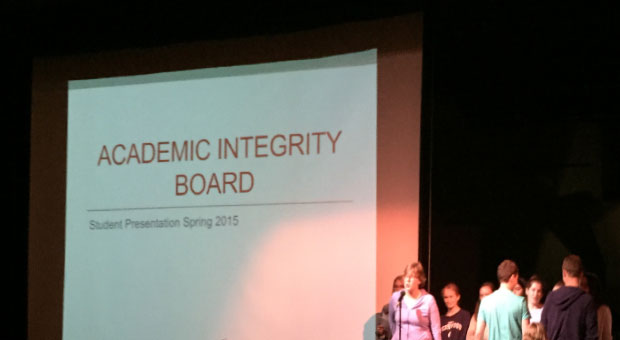Have you ever sat in a class where a teacher was blind to the cheating or plagiarism occurring in his/her classroom, and not known what to do or who to approach? If you haven’t, then many of your peers probably have. Do you actually have any idea which translators you can use for your language class without breaking ethical boundaries? Until very recently, most of the school had absolutely no idea.
Many members of the Fieldston community have expressed their frustration with the inconsistencies of the school regarding issues of academic honesty and integrity. Not only have students sensed a lack of consistency and transparency, but also teachers often feel uncomfortable with the current punitive measures taken and the ways in which the deans have handled cases of academic dishonesty.
The goal is not to place blame; no one believes that students, teachers or administrators are intentionally disregarding the importance of academic integrity — instead, this is a community-wide problem that we all need to address. Unfortunately, there is not currently a standardized system at Fieldston which handles academic integrity infractions; while one teacher may drop a case, in a similar situation another might refer the student to the Disciplinary Committee.
This is where the Academic Integrity Board (AIB) comes into play. The goals of the Board, as stated by Dr. Tammi, a history teacher who has dedicated an enormous amount of time and effort in order to form this committee and has spearheaded the entire process, is as follows: “To oversee educational work around academic honesty on campus…, to ensure academic honesty norms are understood by all members of our community and resources made available…, to create consistency in how violations of academic integrity are handled… [and to give] students agency in the process. Thus, we hope students begin to see academic integrity as a community issue that primarily hurts/benefits the students.” The planning committee for the AIB (consisting of representatives from every grade and faculty members from all academic disciplines), known as the Academic Integrity Planning Committee (AIPC) worked tirelessly to form a plan from which all members of the community can benefit. After many meetings, roundtables, and faculty discussions over the past three years, (and equally as many arguments) we have formed a final committee which created guidelines that the Board will follow.
The Board will consist of two elected representatives from each grade, the Assistant Principal, a member of the Learning Center, an elected representative from the faculty, and the Dean of any student being brought before the AIB. Similar to the Disciplinary Committee, students will be elected based on paragraphs they submit. Confidentiality is integral to the process; all members of the Board must agree not to share any information that is discussed within the Board or discuss details of any hearings that have occurred. All members will also assist in the educative role of the Board and must thoroughly understand community norms.
If a teacher thinks you cheated on a test, here’s what will happen: the teacher will first tell you that they noticed a problem and discuss it with you. If he or she still feels that it is not a misunderstanding and has been an actual infraction, he or she will approach the “Primary Reviewers,” who are the Assistant Principal, a student from the AIB and a faculty representative. They will all meet and discuss the issue, and then the Primary Reviewers will decide whether the case should be dropped or move on to the AIB. If the case moves on to the AIB, the student will then be informed of the upcoming meeting, and can bring an advocate with him or her to be there for moral support. After the meeting, during which the student can present his or her case, the Board will discuss possible restorative justice methods depending on the student’s infraction and their history of academic behavior, and will follow-up with the student soon after.
Rather than using punitive measures, the Board will advocate returning the student to his or her prior place in the community. It will also focus on involving the community-at-large, in addition to the victim and offender, and repair the harm caused. Examples of restorative justice include leading a MAD, or writing a reflection.
While the AIPC has attempted to cover all necessary parts of the process, the makeup and role of the AIB, it would be foolish to believe there will be no weaknesses or shortcomings. Because of this, the AIPC has determined that the AIB will be fluid. At the end of each year, AIB members are required to meet to discuss how the AIB has functioned throughout the prior year and if necessary, tweak the Board rules according to its needs. The first years of the Board will likely be full of changes and stages of trial-and-error, a “work-in-progress”. However, there is no doubt that this Board will from the onset, function properly and benefit the entire Fieldston community.






